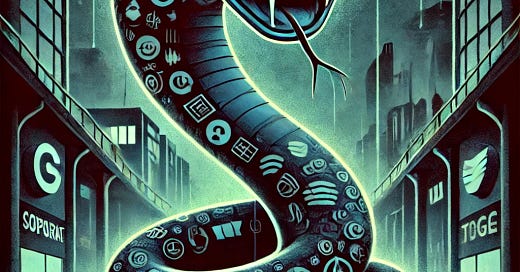Introduction
In the Bible, in the book of Luke, we are told who our neighbor is. In this passage, a lawyer asks Jesus, “Who is my neighbor?” and Jesus responds with the parable of the Good Samaritan. The takeaway here is that everyone is your neighbor.
We have a clear definition of what makes a good neighbor or, perhaps better put, what makes a good friend. However, we do not have a clear definition of who our enemy is.
There is a passage that says, “Love your enemies and pray for those who harm you.” While there is good in that sentiment, I would argue that we have developed a sense of passivity towards both “good” and “evil.”
In this article, I want to focus on the question: Who is my enemy? Rather than focusing solely on individuals as enemies, though some certainly are, I will explore a broader perspective.
For these individuals, we should show love and sympathy. This scenario is where the verse about loving your enemies applies. However, we should not take that same approach when we are talking about enemies who enslave or capture us.
You should not love your captor. That is the definition of Stockholm Syndrome. In today’s world, our enemies have become craftier, just as the Bible says: “The devil comes as a deceiver, to steal, kill, and destroy.” This is the enemy we need to be mindful of.
In a previous article, I quoted Bretigne, who said, “The government is not there to help you. The government is not your friend. The government is, in fact, your enemy.” We must stop viewing individuals as enemies and start seeing systems as enemies.
As Paul says, “We battle not against flesh and blood but against principalities.” Principalities rule the world, and we need to understand who these principalities are and what systems they have laid before us.
In this article, we will first define the characteristics of a friend versus an enemy, so we can better understand the two. We’ll then determine our goal here in life regarding freedom, liberty, and autonomy. Then, we will dive into who our enemy is in today’s world.
Without further ado, let’s dive in.
Definition of a Friend
Of the many definitions of the term, I believe this one is the most appropriate: “A friend is one who supports, encourages, and cares for another.”
Characteristics of friendship include:
Mutual respect
Trust
Communication
Empathy
Shared values
Support
Loyalty.
Do these terms describe your government, your bank, and many other entities in your life? Probably not.
So, let’s keep going.
Definition of an Enemy
Now, let’s look at the definition of an enemy. An enemy is a “force or power that opposes or threatens someone or something.”
Another definition is a person, group, or entity that harbors hostile intentions or actions towards another. These are good definitions for us to work with.
The characteristics of an enemy include:
Hostility
Opposition
Active resistance or counteraction
Hidden or open aggression
Conflict-driven behavior
Malevolence, with the intent to harm or cause damage
Distrust or a lack of faith or confidence
Isn’t this a more accurate description of our banks, governments, and corporations?
Now that we have defined “friend” and “enemy,” let’s move on to additional definitions that will set the foundation for this discussion: freedom, liberty, and autonomy.
Definitions of Freedom, Liberty, and Autonomy
Freedom is defined as the ability to act, think, or express oneself without restraint. Examples include freedom of speech and freedom of travel.
Liberty refers to specific rights or privileges protected by law (natural law), with an emphasis on individual rights and protections.
Autonomy is the ability to self-govern, make independent choices, and exercise individual agency or control.
The Main Argument: Who Is My Enemy?
Now that we’ve laid down these definitions let’s move to the heart of the argument: In this world, we have friends and we have enemies.
While we are called to love individuals who act as our enemies, when it comes to systems, principalities, and policies, these are enemies that oppose us.
Our ultimate goal in life can be seen as the striving for liberty. Liberty and autonomy are divine rights that we are born with. We do not need to fight for freedom when we have liberty.
In fact, as Stone Bryson says in his article, we don’t need freedom when we have liberty. (Examples of freedom include freedom of speech and freedom to travel.)
When we possess liberty and autonomy, we don’t need external governance because we are self-governing individuals. The question now becomes: Who is the enemy preventing us from achieving these goals?
Returning to the quote from earlier, “The government is not your friend. The government is, in fact, your enemy.” If the natural goal given to us by the Creator is liberty and autonomy, then anyone or anything that opposes these principles is an enemy.
Laws, rules, or policies that prevent us from governing ourselves are adversarial in nature, and the sooner we realize this, the sooner we have a more accurate view of reality.
Conclusion
The Bible tells us that the enemy is cunning. He comes as a deceiver. If we examine our modern world, we often fail to recognize who our enemy is.
In fact, as a society, we have come to love our enemy. We have subconsciously internalized the command to “love your enemy” to the point where we love those who oppress us.
The goal of this article is to lay down the principles of who exactly our enemy is. Anyone or anything that stops you from achieving or walking in your rights of liberty and autonomy is an enemy.
We were born with these rights. You don’t need anyone to grant them to you. Anything that tries to enslave you and call it “freedom” is your enemy.
When your bank charges you high interest rates, it attacks your ability to practice liberty and self-governance.
When you are trapped in mortgages or debt, these are bondages placed against you by your enemy.
If you walked into these traps unknowingly, it’s because you’ve fallen under the influence of menticide, an enemy attack designed to destroy your mental sovereignty.
This scenario is the world we live in, and unfortunately, many people are unaware of it. But some of us are waking up.
We are beginning to realize that the real battle is not Democrats vs. Republicans, Christians vs. Muslims, or Black vs. White. The real problem lies with the rulers, who are all on the same page: “Our job is to rule this world.”
Meanwhile, we who are ruled are busy fighting among ourselves.
We need to come together and identify the real enemy. Once we do that, we can slowly but surely break down the traps laid before us.
Freedom is an illusion. We were born with liberty. As Patrick Henry said, “Give me liberty or give me death.” Either I live life on my terms, or there is no point in living.
If you enjoyed this article and want to explore this topic further, especially other articles that build upon these ideas, I recommend becoming a paid subscriber. By doing so, you’ll gain access to many of my archived articles that discuss principles, critical thinking, and how to navigate this complex world.
We are at war, even though many do not realize it yet. By becoming a paid subscriber, you will gain access to resources and insights to help you maneuver through this world.
Thank you for your time and attention. If you can’t become a paid subscriber but still want to support this work, feel free to buy me a coffee or take me out to lunch.
Lastly, if these terms sound familiar but you’re still seeking more clarity, check out my book An Unorthodox Truth, where I compile the last 200 years of world history to provide an accurate view of who our true enemy is.
Thank you again for your time and attention. Let’s be great. Ashe,
Franklin O’Kanu.











Very nice essay!
Our enemies are the people (parasites/reptilians) children of Satin. Deviants void of morality or consciousness.